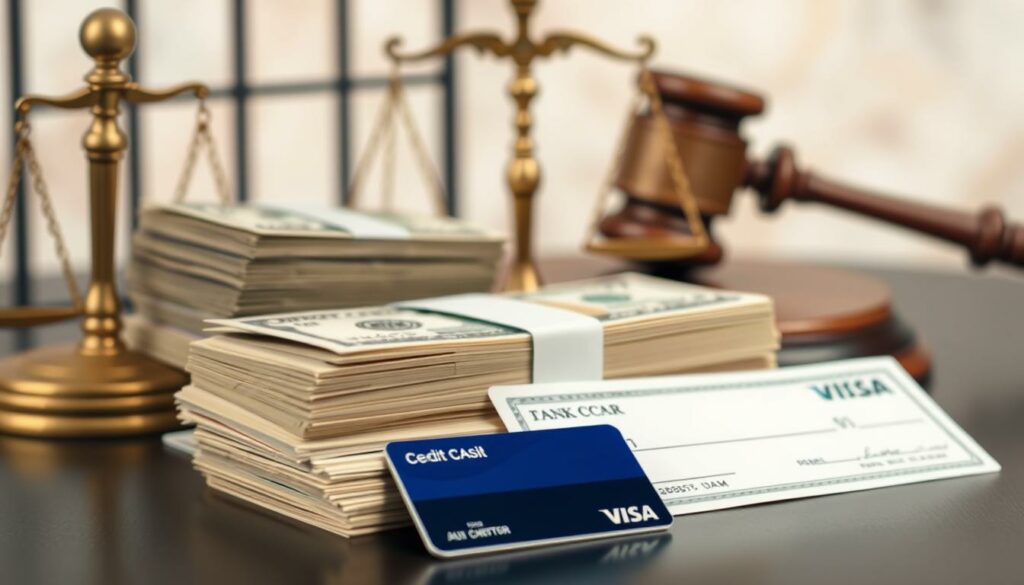
27 Jan Can You Bail Yourself Out of Jail?
Many people wonder if they can bail themselves out of jail. The answer is yes, in many places in the United States, like California. Self-bailing lets you get out of jail on your own without needing help from others.
It’s important to know how to bail yourself out if you’re in this situation. You need to understand the bail system, meet certain requirements, and follow the right steps. Knowing your options can help you get free quickly.
If you’re asking how to bail yourself out of jail, remember the process varies by place. Things like the charges against you, your criminal history, and how much money you have affect if you can self-bail.
Key Takeaways
- Self-bailing is legal in many U.S. jurisdictions
- The process requires understanding bail options and requirements
- Eligibility depends on various factors, including charges and resources
- Self-bailing can be faster than waiting for third-party assistance
- Knowledge of local bail procedures is essential for success
Understanding the Bail System in America
The bail system in America is key in the criminal justice process. It lets people accused of crimes get out of jail while waiting for trial. Let’s explore the main parts of this system and its impact on pretrial detention.
What is Bail and How Does it Work
Bail is a financial promise to the court that a defendant will show up for their court dates. When someone is arrested, they might be able to post bail to get out of jail. The amount of bail depends on the crime’s severity and the defendant’s past crimes. Learning about bail is important for those in legal trouble.
Types of Bail Available
There are different types of bail bonds in the American legal system:
- Cash bail: Paying the full bail amount in cash
- Surety bonds: Getting through a bail bondsman
- Property bonds: Using property as collateral
- Citation release: Being released on your own recognizance
Legal Rights Regarding Bail
Defendants have rights when it comes to bail. They have the right to fair bail amounts and a bail hearing. Courts look at several factors when setting bail, like the risk of flight and public safety. Understanding your bail rights is key to navigating the system well.
By understanding the bail system, people can make better choices about their pretrial release. This helps avoid long periods of detention.
Can You Bail Yourself Out of Jail?
Many people ask, “Can I bail myself out of jail?” The answer is yes, in some cases. If you’re not seen as a flight risk or danger, authorities might set a bail amount.
Whether you can bail yourself out depends on your crime and the bail amount. For small crimes, you might post bail at the jail. But for bigger crimes, you’ll need to go to a bail hearing first.

At bail hearings, a judge looks at your case and sets bail conditions. These might include travel limits or regular checks with the police. If you can afford it and meet these conditions, you can bail yourself out.
Self-bailing has its perks:
- You get out of jail faster
- You keep your privacy
- You don’t need to deal with bail bond companies
But there are downsides to self-bailing too:
- It costs a lot upfront
- Legal procedures can be complex
- Meeting all conditions on your own is tough
Before you decide to bail yourself out, think about your situation and what you can afford. Talking to a lawyer can help you understand your options and what might happen next.
Requirements for Self-Bailing
Learning about the diy bail process is key if you want to post bail without a bondsman. Self-bailing means meeting certain court rules. Let’s look at what you need to know.
Financial Requirements
For self-bailing, you must have the full bail amount ready. This amount can be very high, based on the crime. Bail payment options include cash, cashier’s checks, or property bonds. You’ll need to show you have the money or assets to pay the bail.
Legal Eligibility Criteria
Not everyone can self-bail. Courts look at several things:
- Flight risk assessment
- Severity of the alleged crime
- Criminal history
- Ties to the community
If you’re seen as low risk and not a danger, you might qualify for self-bailing.
Documentation Needed
Having the right documents is important for self-bailing. You’ll need:
- Valid government-issued ID
- Proof of residence
- Financial statements
- Employment verification
These documents prove who you are and your stability. Understanding the bail process well can help you get released without a bondsman’s help.
Methods of Posting Bail

Courts provide different ways to post bail. Cash is the simplest method. You can pay the full amount at the courthouse or jail. This method is quick but keeps a lot of money tied up.
Cashier’s checks are another choice. They work like cash but leave a paper trail. Some places accept credit cards, making things easier. Personal checks might be an option in some areas, but rules vary.
If you can’t pay the full amount, a surety bond is a good alternative. Armstrong Bail Bonds offers various payment options, including flexible financing in Southern California.
Think about these points when picking a payment method:
- Processing time
- Potential fees
- Fund availability
- Local jail policies
Each option has its advantages and disadvantages. Cash is fast but risky. Credit cards are easy but can be expensive. Surety bonds let you pay over time but cost more. Choose based on your finances and your case’s needs.
Release on Own Recognizance
Pretrial release without bail is possible through personal recognizance. This lets defendants wait for trial outside jail, based on the judge’s choice.
Eligibility Criteria
Courts look at several factors for personal recognizance release:
- Community ties
- Criminal history
- Nature of the alleged offense
- Flight risk assessment

Application Process
To ask for pretrial release on personal recognizance, defendants must:
- File a motion with the court
- Attend a bail hearing
- Present evidence of community ties and reliability
- Await the judge’s decision
Terms and Conditions
If granted personal recognizance release, defendants must follow specific conditions:
- Attend all court appearances
- Avoid new arrests
- Maintain contact with pretrial services
- Adhere to travel restrictions
Breaking these rules can lead to immediate arrest and detention. Personal recognizance is a cost-free option, but strict compliance is required.
Working with Bail Bond Companies
Bail bonds help you get out of jail if you can’t pay the full bail. It’s good to know how to post bail without a bondsman. But, understanding bail bond services is key.
How Bail Bondsmen Operate
Bail bondsmen act as guarantors for defendants. They post bail on their behalf. If the defendant doesn’t show up in court, the bondsman pays the full bail amount.
This service lets people get out of jail without paying the whole bail amount upfront.
Costs and Fees
Bail bond companies charge a non-refundable fee of 10% of the bail amount. For example, if bail is $10,000, you pay $1,000 to the bondsman. This fee covers their service and the risk they take.
Finding a Reputable Bondsman
When looking for a bail bond service, consider these factors:
- Licensing: Make sure the bondsman is licensed in your state
- Experience: Choose companies with a good track record
- Transparency: Good bondsmen explain all fees and terms clearly
- Availability: Pick a service that’s available 24/7
While bail bonds are useful, learning how to post bail without a bondsman can save money. Think about your financial situation and the bail amount before making a decision.
Situations When Self-Bailing is Not Possible
While many can post bail themselves, some situations make it impossible. It’s important to know these cases when facing pretrial detention.
Severe crimes often lead to strict bail rules or no bail at all. If you’re accused of a crime that could mean life in prison, you might not get out. In such cases, you must stay in jail until your trial.
Courts look at many things when deciding on bail:
- Flight risk
- Danger to the community
- Severity of the alleged crime
- Prior criminal record
If a judge thinks you’re a big risk, they might not let you out. Some places have rules that mean you can’t bail yourself out for certain crimes.
For domestic violence or repeat crimes, courts might set special bail rules. These could include orders to stay away from someone or programs to help you change. These rules can make it hard or impossible to bail yourself out.
Every case is different. If you can’t bail yourself out, talk to a lawyer. They can help find other ways to get out of jail or prepare you for staying there until your trial.
Steps to Post Bail Successfully
Posting bail is a key part of the DIY bail process. Knowing the steps helps make the court experience smoother.
Payment Methods Accepted
Courts accept different ways to pay bail. Cash is the most common choice. Some places also take cashier’s checks or money orders.
In some areas, you can use credit cards or electronic transfers. This makes paying bail easier for many people.
Processing Time
The time it takes to process bail varies. If you pay with cash, you’ll get released quickly. Checks might take a few hours to clear.
Electronic payments, if available, are usually faster. But, expect delays on weekends or holidays.
Required Documentation
You’ll need certain documents for the bail process:
- Valid government-issued photo ID
- Proof of funds for the bail amount
- Court-issued paperwork detailing the charges and bail amount
- Proof of residence or employment (in some cases)
By knowing these steps and preparing, you can handle the DIY bail process better. Remember, each place might have different rules. It’s best to check with the local court or detention facility.
Legal Consequences and Obligations
When you get pretrial release, it’s key to know the legal duties that come with it. Bail conditions are not just suggestions. They are strict legal rules you must follow.
The main duty is to show up for all court dates. Missing a court date can lead to big problems:
- Forfeiture of your entire bail amount
- Issuance of an arrest warrant
- Additional criminal charges
Pretrial release often comes with specific rules. These might include:
- Regular check-ins with court officers
- Travel restrictions
- Substance abuse testing
- Avoiding contact with certain individuals
Breaking any of these rules can mean being arrested again right away. It’s vital to take these rules seriously and follow them exactly.
Remember, pretrial release is a privilege, not a right. By following all conditions, you show respect for the legal system. This can help your case in court. Always check what your bail conditions are and ask for help if you’re unsure.
Conclusion
Bailing yourself out of jail is possible, but it depends on your money and understanding of the bail process. Many ask, “Can you bail yourself out of jail?” Yes, if you meet certain conditions. Knowing your legal rights and duties is key when thinking about this.
Self-bailing means looking at several things. You need to check your finances, legal status, and the documents you need. It’s important to think about the good and bad of cash bail or reputable bail bond services.
If you’re wondering, “Can I bail myself out?” there are other choices. Some might get released on their own promise, while others might need bail bond services. Your situation will decide the best choice for you. No matter what, you must follow the law and show up for court.
The bail process can be hard and stressful. If you’re facing a situation where you need to think about bail options, get legal advice. A skilled lawyer can help you understand the bail system and make smart choices.

